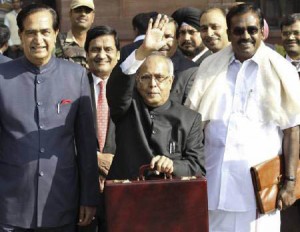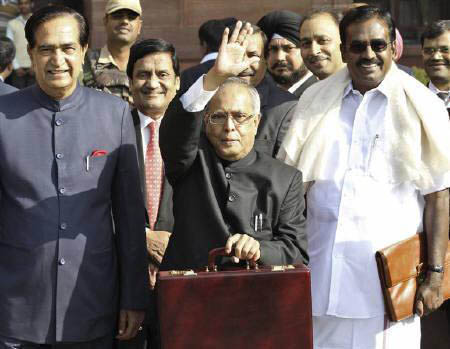By: Ravi Sinha
 Real Estate developers across the country have termed the Union Budget 2011-12 as a tie cricket match which can’t be termed as won or lost. However, they are all unanimous that it is not a game changer budget for the sector. The developers’ final cost-benefit analysis finds more negatives than positives and majority of them say the Finance Minister has pointedly ignored the larger issues affecting the sector at this sensitive stage of revival and growth. While Pranab Mukherjee’s focus on affordable housing seems to have cheered up a section of the realtors who have projects in the segment, the sector by and large is questioning as to why the Government has been ignoring them and giving a cold shoulder.
Real Estate developers across the country have termed the Union Budget 2011-12 as a tie cricket match which can’t be termed as won or lost. However, they are all unanimous that it is not a game changer budget for the sector. The developers’ final cost-benefit analysis finds more negatives than positives and majority of them say the Finance Minister has pointedly ignored the larger issues affecting the sector at this sensitive stage of revival and growth. While Pranab Mukherjee’s focus on affordable housing seems to have cheered up a section of the realtors who have projects in the segment, the sector by and large is questioning as to why the Government has been ignoring them and giving a cold shoulder.
The sector is though happy with the move to increase the priority housing loan limit to Rs 25 lakh. They term it as a positive one that will lead to increasing the base of home loan takers and thereby a boost for affordable housing. Not given industry status is being termed as the biggest disappointment. Jitendra Jain, MD & CEO, Neev Group of Companies says, “Had the government given it an industry status, bank financing would have been easier for real estate companies. Affordable housing should have got some fiscal incentives as this would address affordability issues. The Proposal to increase rural housing fund to Rs 3,000 crore from 2,000 crore will lead to developments in the rural areas.”
Sunil Dahiya, Managing Director of Vigneshwara Developers exudes optimism when he says the developers now need to refocus on their strategy and make best use of what the sector has got. “With the focus on affordable housing the Finance Minister has tried to enhance consumption at the bottom of the pyramid. I personally welcome the budget for providing impetus to this under nourished market which is actually very dynamic market. The way tier-II and III cities are being renovated, we need to be part of that growth story as well,” he said.
Brotin Banerjee, CEO and MD, Tata Housing Development Company also feels the budget is positive. “The interest subvention scheme of 1 per cent on all individual housing loans up to Rs. 15 lakh for units costing up to Rs. 25 lakh is a welcome move and would give a boost to low cost housing. The proposal to create a Mortgage Risk Guarantee Fund under Rajiv Awas Yojana will guarantee housing loans taken by EWS and LIG households and enhance their credit worthiness. The investment linked deduction to businesses which develop affordable housing under a notified scheme is also a welcome initiative,” he said.
Not many in the sector are ready to subscribe this optimism though. The mismatch between expectations and offer is aptly summed up by Lalit Kumar Jain, CMD. Kumar Urban Development and VP CREDAI. He says, “The unfulfilled demand of more than 24 million houses in the country needs large scale impetus to achieve desired results. Allowing deduction for investment into affordable housing is a welcome step and will surely boost morale of housing industry and will accelerate investments in affordable housing. Increase limit to 15 lakhs for 1 per cent subvention, increasing limit to 25 lakhs for priority lending for home loans are welcome. However much more could be done to accelerate supply of affordable housing stocks. Also we register our displeasure over MAT in SEZs. Government should not deflect from declared policy of tax exemptions as this gives wrong signal to investors in such projects.”
Atul Modak, Head of Kohinoor City calls 1 per cent tax subvention as a populist gimmick which will neither benefit the developers nor the end users. “With our substantial share in the GDP I fail to understand why the Finance Minister is repeatedly ignoring the sector. What was actually needed was to bring down taxes and stamp duty, because even a 2BHK flat in cities like Mumbai costs more than 50 lakhs today,” he adds.
Navin M Raheja, MD, Raheja Developers rues that the sector didn’t get long awaited government support for reforms in the sector. “No effort has been made to counter the liquidity crunch. The budget is more focused on rural and social development of the country. Emphasis has been given to infrastructure and rural development. Overall budget is good for the general public. But it fails to the expectations of Real estate and SEZ. Also, imposition of service tax on hospitals and hotels will add cost to basic necessities. FM has not considered any of the demands of reality sector,” he said.
Agrees Anuj Puri, Country Head of JLLM, when he says that there is nothing in budget for real estate to get excited about. “SEZs have been brought under the purview of MAT, which basically diminishes the benefits that SEZs offer for developers over other commercial real estate asset classes. The budget remained silent on the pressing issue of extension of the STPI exemptions as well and Sec 80IA and 80IB, which are pertinent to the construction of residential projects of units sizes below 1200 sq. ft. This is a de-motivating factor which will further curtail the supply of affordable housing,” he said.
The sector is undoubtedly divided over the cost-benefit analysis of the Union Budget 2011-12. While a section of the developers who are into or looking forward to get into affordable housing are relatively satisfied with what has been offered by the Finance Minister, his Pandora box has definitely failed to fulfill the expectations of the sector that has weathered a storm in the last few years and still contributed significantly to the GDP. That may be the reason why they rest their hope high with the government. But then as a developer laughs it out saying, “earning boy in the family is often made to sacrifice for the sake of deprived one.”





